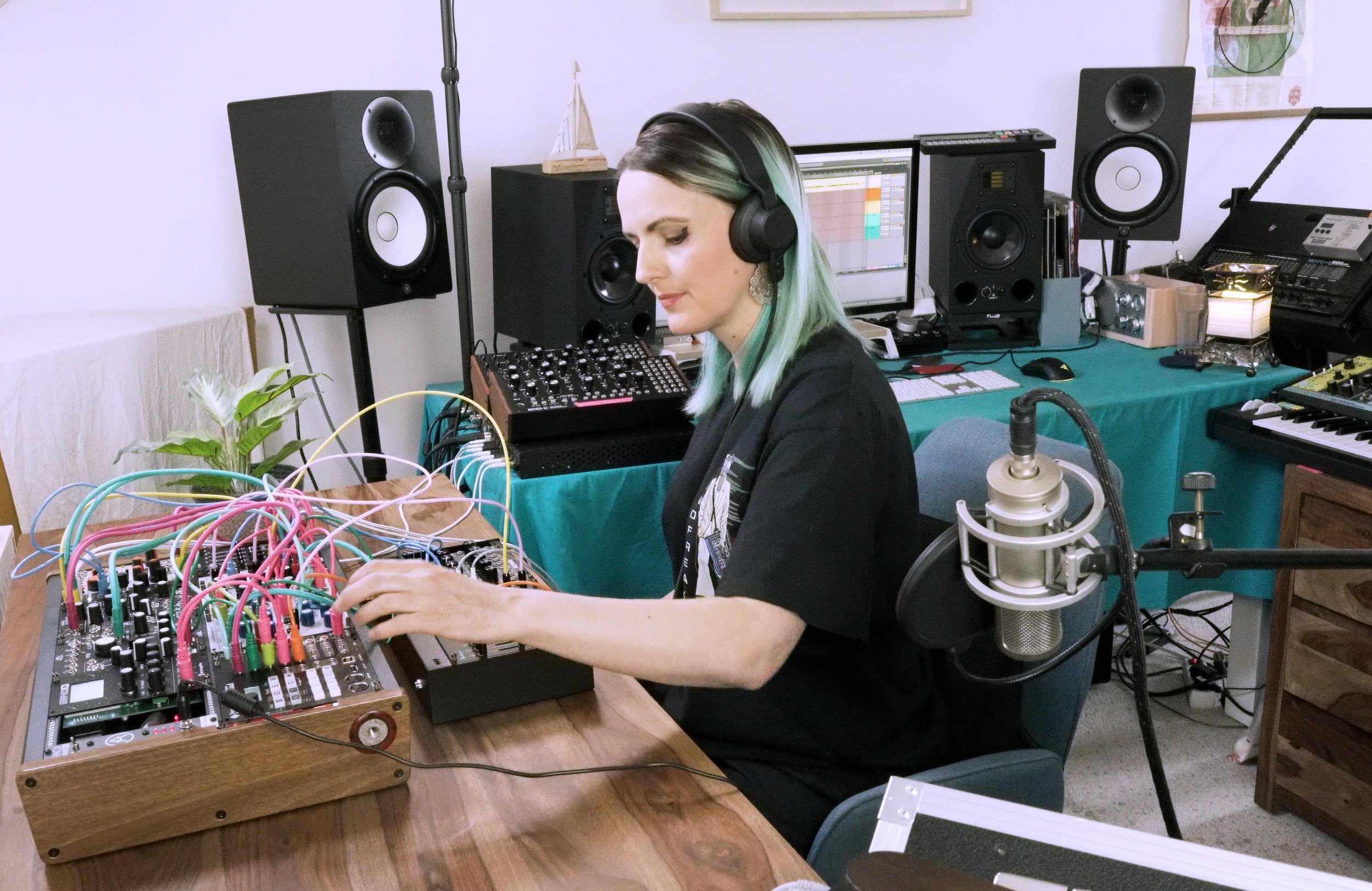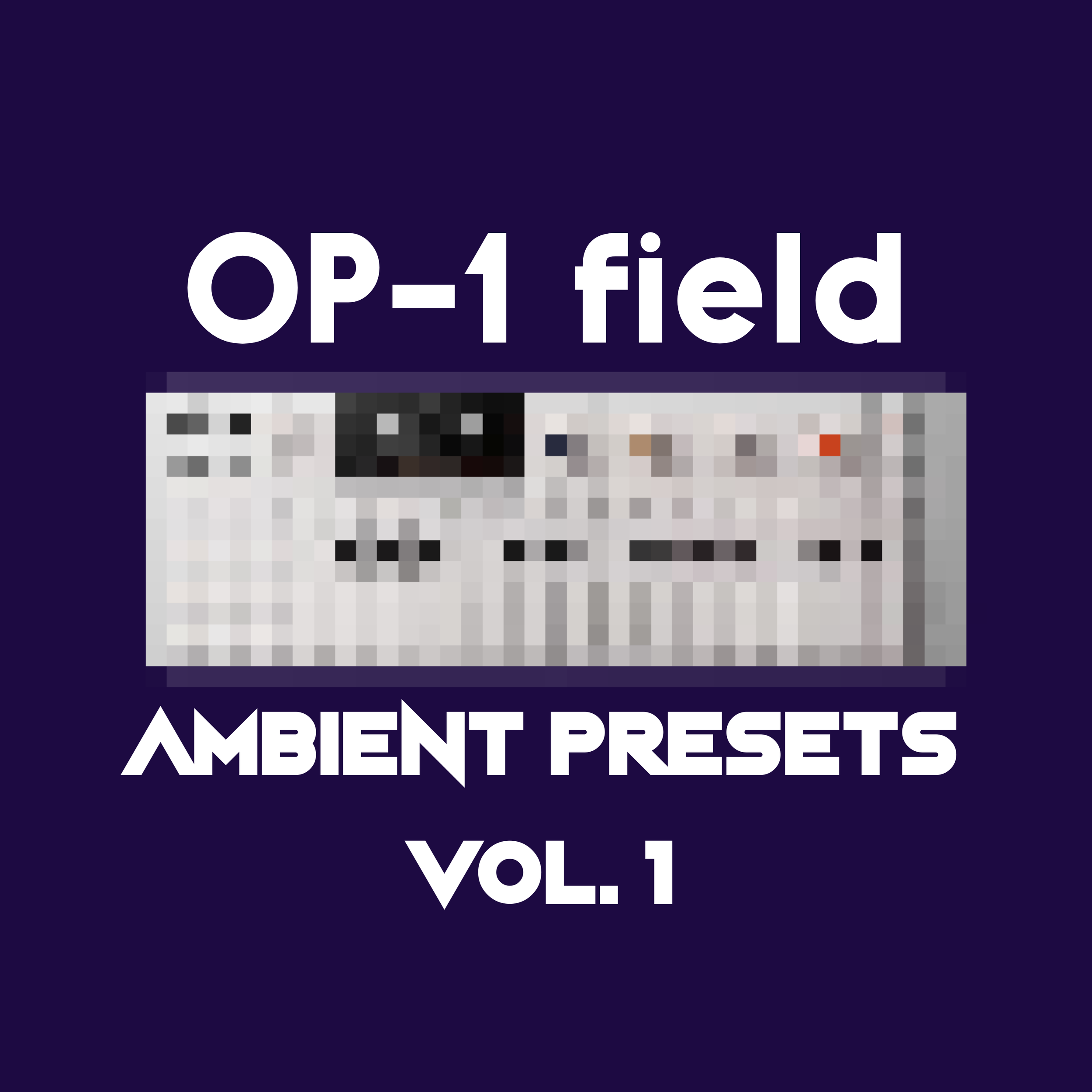Panic Girl - Interview
From classical training to electronic music production!
Panic Girl is a composer and synthesizer sound designer based in Munich, Germany. After receiving classical training in piano, guitar, and singing she got deep into the production of electronic music. Her sound can be described as a deep mixture of electronica and experimental cinematic sounds and she writes and produces all of her music on her own.
She’s been a very versatile and fascinating artist who releases her own albums, composes music for films, and at the same time manages to find time to create educational content on her social media demystifying the world of modular synths and electronic music production.
So we’re so happy we got the chance to have a chat and have Panic Girl joining us for our 3rd Artist Spotlight and answering all of our questions!
Q: So, tell us, what you’ve been working on lately?
I was lucky enough to be beta-testing the newest synthesizer by Waldorf, the Iridium Core. It was my first Waldorf instrument and I was very impressed by the powerful sounds you can generate with it. Additionally, it’s very easy to sync it to your DAW, Eurorack system, or controller of choice. This makes it a joy to play with other gear in the studio, when being on tour, or when you take it to a friend for a jam. Apart from that, I’m always working on various projects for my day job at the public radio station in Munich. At the moment I’m composing music for a new True Crime podcast that takes place in the animal world. It’s basically about the extinction of species.
Q: Your sound is mostly based on ambient experimental music and soundscapes. What draws you to this certain type of sound?
I’m a lot into experimenting with the instrument at hand. I love searching for unusual sounds and creating new timbres and interesting textures. In many cases, the sound dictates where the composition will go next, especially when I’m not working on a job, but composing for myself.
Q: You have received classical training in piano & guitar. When did you first start messing around with synths & modular? And what made you fall in love with them and take the electronic music path?
I started making music in my teenage years. First I played in a band as a guitarist and singer, which was a fantastic time to explore and to have fun with friends. Sometime later I discovered the album “Mezzanine” from Massive Attack and I was completely blown away by the production, the vibe, the compositions. I bought myself some equipment and learned how to make electronic music, always with that album in mind. My first synthesizer was a Virus TI from Access Music back then. As I enjoyed the technical side more and more I eventually decided to study Audio Engineering at the SAE Institute in Munich. A couple of years later I went to the local music shop in Munich and saw this futuristic-looking machine standing there, all silver and so beautiful to look at. It was a 6U Doepfer A-100 system, and I needed to have one right away. I was totally fascinated after this first encounter and have been ever since.
Q: Congratulations on writing music for the Netflix Film called “Paradise”! Tell us a bit more about that. What was your process of making music for a film?
Thank you! I co-composed the soundtrack for “Paradise” together with David Reichelt, who was the main composer for this project. It was a dream coming true for me as I wanted to get into movie scoring for a long time. Starting off such a big production with an experienced composer on my side was amazing. I learned a lot and the score turned out fantastic. David Reichelt did most of the compositions for the film while I designed most of the synthesizer sounds.
Q: You also run your own record label, “i u we records” that supports female diversity in electronic music. What’s the biggest challenge of running a label?
The biggest challenge is to organize my day efficiently enough, so I have enough time for all of my projects at the moment. Having a day job, a label, working on projects as a freelancer, writing articles for a magazine, and having a small child, with whom I spent half of the day with, isn’t always easy to juggle. But I really love the variety in my everyday life and wouldn’t trade it for a “normal” 9-5 job. The label work itself is very rewarding, as I get to work with so many talented artists. And bringing their music to a bigger audience is wonderful. A couple of weeks ago for example I received a message from Ben Watt in my inbox, complementing Margot Blue’s debut album, which was amazing to me as I’m a longtime fan of “Everything But The Girl”.
Q: Nowadays artists are forced to produce more and more content for social media. How do you find balance between recording an album and making “content” for your social platforms?
It’s always a balancing act for sure. I usually make sure to post once a week at least, but sometimes I have to prioritize my projects and jobs over social media if time is getting short. I don’t want to post “something” just for the sake of having put something online. It always has to have a certain value for me and for my followers.
Q: You also post a lot of educational videos and posts on Instagram & YouTube about modular synths. Do you see yourself becoming a teacher/ instructor of electronic music production in the future? What is your favorite thing about sharing all this knowledge you acquired with other people?
Being an instructor and teacher was actually one of my first jobs in the audio sector. After finishing my studies at the SAE Institute in Munich I started working there as a supervisor. I answered all sorts of questions from the students while they were practicing on one of the many workstations or studios we had at the institute. Then I started giving lectures and finally became a Head Instructor for the Electronic Music Producer course. It was a very exciting and defining time for me for several reasons. For one I was the first woman to be working there in the audio department. Apart from that, I was confronted with lots and lots of questions from the students during my shift. So I had to learn how to answer all those questions as fast as possible. I never learned more than during those years while I worked there.
My favorite thing about sharing knowledge is to remember how I felt when starting out myself and to try and explain the matter at hand as easily as possible, with a “beginner’s mind” so to speak. There are no stupid questions and you can never explain it simply enough to get a solid foundation. The feedback I usually get is very rewarding and I love getting into conversations with the students afterwards. I myself am still learning so much every day and hopefully will continue to do so!
Q: How do you usually start a song?
It depends if I'm working on a project or if I’m making music for myself. If it's the latter then I like to take some time to design new sounds first and let the sound define where I’m going next. If I’m writing music for a project or a job, then it really depends on the briefing I got for the music. It then defines which sounds I’m going to use, if I need acoustic instruments or if there should be synthesizer sounds, what the mood should feel like, and so on. I often like to start by searching for the sounds first and then continue writing the melodies.
Q: You’ve been working a lot with modular synths. What’s the best and worst thing about using a modular synthesizer?
The best and worst thing at the same time is that you can build your dream instrument from scratch by deciding on a set of modules. It gives you so many possibilities and is a very flexible system, but it never seems to be “finished” on the other hand. It’s a real rabbit hole! But a rewarding one for sure.
Q: You’ve played a lot of live shows. How do you plan your live setup? Any tips & tricks on performing your tracks live as a solo artist?
Playing live depends on many personal preferences and also on the music you’re playing. When you play solo with your modular I would recommend to rehearse as often as possible so you feel comfortable with your setup. The more you know your set and setup in and out the more you can enjoy the experience on stage. Then I would recommend preparing some safety nets, in case something goes wrong with your gear. Beyond that I would make a list beforehand of what you need to pack for your gig, so you don’t forget anything. And pack some extra cables, you never know!
Q: Who is your biggest musical inspiration?
There are so many. Some of my musical heroes are Hans Zimmer, Pink Floyd, Massive Attack, and Tool among others.
Q: Desert island piece of gear?
Definitely my EMS Synthi A. It may not have the newest technology incorporated and it also doesn’t fit into a backpack like other instruments. But it has so much character and is just a joy to explore with its patch matrix and pins.
Q: Your absolute favorite effects pedal and module?
I really like the Moogerfooger Ringmodulator and the Microcosm by Hologram Electronics a lot. As for my favorite module, I would go with the Malgorithm from The Harvestman at the moment, a 16-bit Bitcrusher and Waveshaper. I've had it in my case for several years now and it is such a joy to play with. It adds character and depth to my sounds and it can also get very loud and aggressive. Another module that is getting more and more important in my setup is the Magneto Delay module by Strymon. It just makes every audio signal sound better, and more interesting as it adds so much character to it.
Q: And lastly, what’s the best advice you’ve got on making music?
I think the biggest challenge is not to sound like someone else. Everyone has their inspirations and favorite artists and it’s a useful challenge to produce a track that sounds like them for sure. It’s also tempting to use presets and loops, but it makes many productions sound generic in a way. I’d recommend investing time and effort to find your very own voice and sound because no one else will make music like you do. And that’s definitely worth exploring.



















